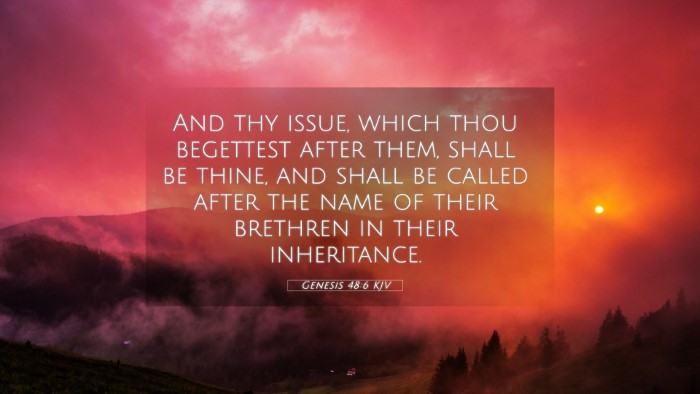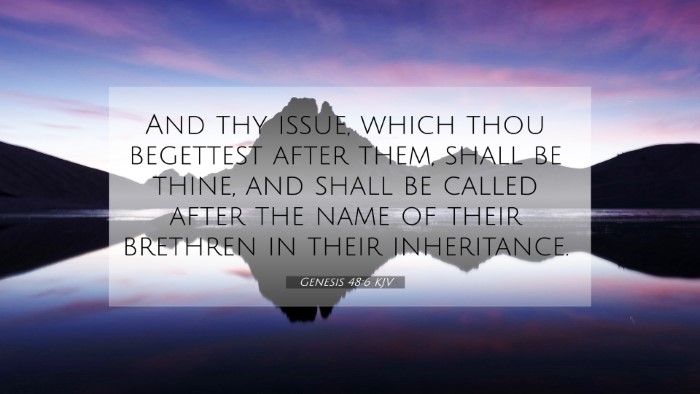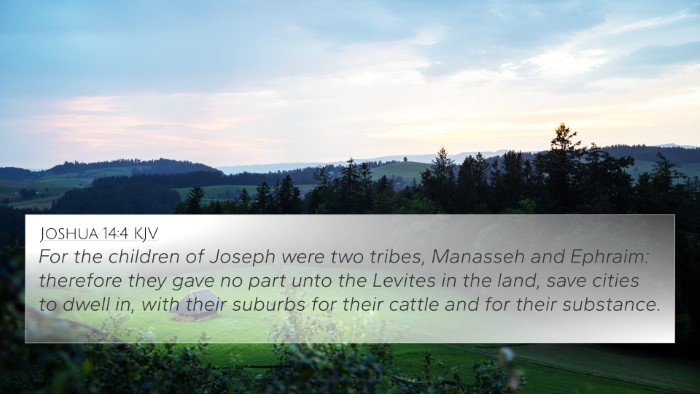Understanding Genesis 48:6
In Genesis 48:6, Jacob expresses his desire for his grandsons, Ephraim and Manasseh, emphasizing that they will be considered his own sons. This verse carries significant weight in the narrative of the Israelite tribes, establishing the dual role of these two grandsons as tribes in their own right, and the blessings associated with them. The analysis of this verse draws on insights from public domain commentaries such as those by Matthew Henry, Albert Barnes, and Adam Clarke.
Verse Context
The context of this verse is critical in understanding its implications. Jacob, on the verge of his death, gathers his sons and grandsons to pronounce blessings and finalize his will. Here, he formally adopts Ephraim and Manasseh, elevating their status within the family lineage of Israel.
Commentary Insights
-
Matthew Henry:
Henry emphasizes the significance of Jacob’s adoption, noting that it suggests continuity in God's promises. By adopting Ephraim and Manasseh, Jacob ensures that his lineage remains strong through them, thereby reaffirming God’s covenant with Abraham, Isaac, and Jacob.
-
Albert Barnes:
Barnes elaborates on the broader implications of this adoption. He points out that Ephraim would become a leading tribe, hinting at the future prominence of this tribe in the history of Israel. This verse also underscores God's favor upon these boys, positioning them within the larger divine plan.
-
Adam Clarke:
Clarke connects this verse to the themes of inheritance and territorial distribution among the tribes of Israel. His interpretation highlights that Jacob's declaration serves to alter the inheritance patterns, redefining them according to his vision and God’s directives.
Bible Verse Cross-References
Genesis 48:6 can be linked with several other verses that provide depth to its meaning. Some notable cross-references include:
- Genesis 49:1-28 - Jacob's blessings to all his sons, revealing their future roles and inheritances.
- Genesis 46:20 - The birth of Ephraim and Manasseh in Egypt and the context of their upbringing.
- Exodus 1:5 - The multiplication of the Israelites, emphasizing the importance of the tribes of Ephraim and Manasseh.
- Joshua 16-17 - The allocation of land to the tribes of Ephraim and Manasseh, illustrating their significance in the Promised Land.
- 1 Chronicles 5:1-2 - A genealogy detailing the positions of Ephraim and Manasseh among the tribes of Israel.
- Hosea 11:1 - Reference to Israel as God's son, linking back to the theme of God's chosen family, which includes Ephraim.
- Romans 9:4-5 - Discussion on the adoption as sons, a key aspect also captured in Jacob's act.
Thematic Bible Verse Connections
This adoption theme resonates throughout Scripture, with parallels seen in instances where God adopts His people. The connections invite further exploration of how divine adoption unfolds in the Old and New Testaments, exemplifying God’s ongoing covenant.
- This act lays groundwork for understanding tribal identities within Israel.
- Links to New Testament themes of adoption found in Galatians 4:4-7, where believers are considered adopted sons of God.
- Links between prophetic texts that reference the tribes and their roles in redemptive history.
Comprehensive Analysis
To fully grasp the meaning of Genesis 48:6, one may utilize tools for Bible cross-referencing. A Bible concordance or cross-reference guide could facilitate a deeper understanding of the intertextual dialogues established through these scriptures. By cross-referencing Genesis 48:6 with various scripture passages, users can uncover thematic connections and the development of biblical promises.
Conclusion
Genesis 48:6 is not only a moment of familial bonding but a pivotal moment in setting the stage for Israel's future. The layers of meaning derived from this verse call readers to consider more than just the narrative; it encourages an engaged study approach with connections across the Bible. This verse illustrates the importance of lining up verses for comparative analysis, enabling a richer understanding of how each part of Scripture interacts with others. Future explorations can be directed towards identifying connections that not only enrich theological insights but also enhance personal study practices.



